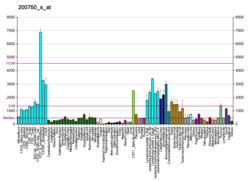Ran (RAs-related Nuclear protein) also known as GTP-binding nuclear protein Ran is a protein that in humans is encoded by the RAN gene. Ran is a small 25 kDa protein that is involved in transport into and out of the cell nucleus during interphase and also involved in mitosis. It is a member of the Ras superfamily.[5][6][7]
Ran is a small G protein that is essential for the translocation of RNA and proteins through the nuclear pore complex. The Ran protein has also been implicated in the control of DNA synthesis and cell cycle progression, as mutations in Ran have been found to disrupt DNA synthesis.[8]
- ^ a b c GRCh38: Ensembl release 89: ENSG00000132341 – Ensembl, May 2017
- ^ a b c GRCm38: Ensembl release 89: ENSMUSG00000029430 – Ensembl, May 2017
- ^ "Human PubMed Reference:". National Center for Biotechnology Information, U.S. National Library of Medicine.
- ^ "Mouse PubMed Reference:". National Center for Biotechnology Information, U.S. National Library of Medicine.
- ^ Moore MS, Blobel G (May 1994). "A G protein involved in nucleocytoplasmic transport: the role of Ran". Trends Biochem. Sci. 19 (5): 211–6. doi:10.1016/0968-0004(94)90024-8. PMID 7519373.
- ^ Avis JM, Clarke PR (October 1996). "Ran, a GTPase involved in nuclear processes: its regulators and effectors". J. Cell Sci. 109 (10): 2423–7. doi:10.1242/jcs.109.10.2423. PMID 8923203.
- ^ Dasso M, Pu RT (August 1998). "Nuclear transport: run by Ran?". Am. J. Hum. Genet. 63 (2): 311–6. doi:10.1086/301990. PMC 1377330. PMID 9683621.
- ^ Sazer S, Dasso M (April 2000). "The ran decathlon: multiple roles of Ran". J. Cell Sci. 113 (7): 1111–8. doi:10.1242/jcs.113.7.1111. PMID 10704362.






